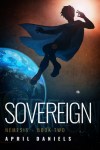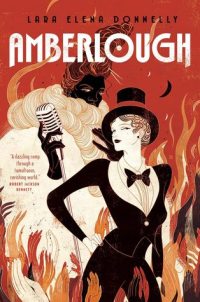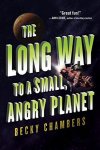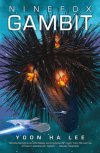Another year, another best-of list.
When it came to writing and posting reviews this year, I fell down on the job, hard (although I am proud I was able to read and review all the freely available short fiction nominations for the Nebula and Hugo awards).
Nevertheless, I read a ton of incredible books this year. So without further ado, here’s my long, in-chronological-order-of-when-I-read-them, list of the best books I read in 2017.

The Devourers by Indra Das
The first book I read in 2017, and I immediately knew upon finishing it that I would be including it in this very list. I love stories about stories and the creation of histories, narratives, mythologies, and peoples, and this three-part epic saga in which werewolves absorb the memories and histories of their prey masterfully combines all these things into an evocative, gruesome, and beautiful story.
 The New Jim Crow by Michelle Alexander
The New Jim Crow by Michelle Alexander
I’m late to the party on this one, but glad I finally got around to joining. A thorough examination of the anti-black racist roots behind the U.S.’s criminal justice system, Michelle Alexander breaks down the racist origins of the War on Drugs, the militarization of the police, and the way each element of the criminal justice system—apprehension by the cops, charges pressed, the prosecutors’ demands, the composition of the jury, time served inside prison, and the parole system for those released—is consciously, deliberately, consistently meant to arrest and imprison black Americans and Latinos. I learned a lot, and I finished this book with a better understanding of the racism inherent in the U.S. criminal justice system and a long list of Supreme Court cases I copied from the book summarizing all the curtailed civil rights of civilians and inordinate liberties granted to cops.
 The Hate U Give by Angie Thomas
The Hate U Give by Angie Thomas
I’m not sure what to say about this book that hasn’t already been said, but here goes—it’s good. It’s really fucking good. Starr Carter was with her childhood friend Khalil when a white police officer pulls them over and shoots Khalil, killing him. Now Star has to survive the aftermath, at home, in her neighborhood, and at her mostly-white prep school, all while speaking out against the police and to tell the true story of what happened that night. Starr is a fantastic protagonist (really every single character is fully fleshed-out and alive), the writing and interconnection of every plot element is flawless, and everything about the story—especially Starr’s family—is filled with so much love it hurts. It is 100% a perfect and perfectly written book.

 Dreadnought and Sovereign by April Daniels
Dreadnought and Sovereign by April Daniels
Superhero books aren’t typically my jam. On the other hand, all other superhero books don’t feature a teenage trans girl named Danny Tozer who a) became a superhero when the then-Dreadnought died and b) in addition to getting his superpowers, had her entire body transformed via Superpowered Gender Confirmation Surgery in the process. Hooray! No more dysphoria! All that’s left for her to deal with are her transphobic and abusive parents, lack of entry into the city’s ultimate superhero fighting league, figuring out how her superpowers work, brand-new friends in the form of a vigilante named Calamity Jane and a mad scientist named Doc Impossible, and various nemeses who want to download all of humanity into the internet, kill all “men” in a fit of TERF rage, and rule the universe, respectively. I loved the writing and world-building, the too-real relatability of Danny’s teenage thoughts and reactions, and—well, I have an essay’s worth of words in me about how I loved the portrayal of Danny’s trans-ness and the way she’s trans as a superhero but also trans as herself, but suffice to say, I loved everything about that.
 Amberlough by Lara Elena Donnelly
Amberlough by Lara Elena Donnelly
This book reminds me mostly of The Devourers, despite the fact that subject, setting, and character, and writing style–wise, these two books are nothing alike. What Amberlough does have in common with the above book (aside from being excellent in all of the above characteristics) is color, otherworldliness (despite there being no magic whatsoever), complicated gender and sexuality explorations, and a grimness and brutality that offsets and emphasizes the moments of beauty and hope. Set in an alt-universe version of the 1930s-era Weimar Republic, complete with vibrant artistic scene and fashionable modernity, two men—a modern man–type spy and a flamboyant cabaret emcee slash smuggler, who are lovers—and a striking, street-savvy female dancer play an intricate game inside and outside each other’s orbits as they attempt to save themselves and each other under the growing shadow of the powerful, new fascist political party.
 A Face Like Glass by Frances Hardinge
A Face Like Glass by Frances Hardinge
Any best-of list written by me is required to contain a Frances Hardinge book. I don’t make the rules, it’s simply the truth. And A Face Like Glass has somehow, incredibly, among all of the other excellent books she’s written, become my favorite. In the underground world of Caverna, where its inhabitants are masters of creating enticing, intoxicating delicacies, as well as court intrigue and assassination, Neverfell, a young girl with no memory of her past and who’s seemingly more than a bit mad, is like no other person in Caverna. You see, she has more than three or five or fifty facial expressions at her disposal. Unlike everyone else, she can manipulate her face at will, to infinity, and without even trying. In a world where deception is required for survival and prosperity, Neverfell’s transparency will shake the foundations of Caverna to its very core. Everything I’ve written about Frances Hardinge’s writing in the past is true here, and in this book her imagination is fully on display, and oh, how magical and exciting and scary and full of hidden depths and wondrous it is.

 The Long Way to a Small, Angry Planet and A Closed and Common Orbit by Becky Chambers
The Long Way to a Small, Angry Planet and A Closed and Common Orbit by Becky Chambers
The reason these two books are excellent is because the characters are nice to each other. Also the writing is good and the world-building is fun and I loved all the different alien species and their different physiologies, cultures, and languages, as well as the way Becky Chambers writes A.I. characters as their own entities who aren’t computer program copies of humans. But the reason I really and truly love these books is because all the main characters—human, alien, and A.I.—form kind, caring, and supportive friendships and families with each other where they figure out how to live and work alongside each other both despite and because of their differences, making jokes and working through misunderstandings along the way. This kind of science fiction, and this kind of storytelling, is soothing to my soul.
 All American Boys by Jason Reynolds and Brendan Kiely
All American Boys by Jason Reynolds and Brendan Kiely
The first book I’ve read of Jason Reynolds and not the last. (I went on to read two more of his books this year, both of which are included in my “Honorable Mentions” list.) This story of police brutality is told from two perspectives—Rashad, a black teenager who was brutally beaten on a cop for allegedly stealing something in a convenience store, and Quinn, a white classmate of Rashad’s who witnessed the beating and who knows the cop by virtue of being best friends with his brother. Both Rashad and Quinn struggle to come to terms with the unexpectedness of the police brutality and what it means for them, individually and for the rest of their town. Reading Quinn’s POV as a white person hit close to home. His story goes beyond a simplistic “Hey, what happened to Rashad was because of racism, and racism is bad!”and has him actively struggle to find words to describe what happened, and then struggle to actually say them out loud, both among his white friends and family and his basketball teammates who are friends with Rashad. At its core, All American Boys is about voice and communication—conversation, art, and protest being only a few examples—and Rashad and Quinn learning how best to use them in order to speak about what happened to Rashad.

 Ninefox Gambit and Raven Stratagem by Yoon Ha Lee
Ninefox Gambit and Raven Stratagem by Yoon Ha Lee
The irony is that last year Ninefox Gambit was on my “Honorable Mentions” list because I couldn’t follow what was going on, but when I re-read it in preparation for reading Raven Stratagem, I freaking loved it. I love the world-building behind the hexarchate, the sardonic sense of humor (Mikodez is going to get shot one day due to excessive driving-his-subordinates-and-everyone-around-him-crazy behavior), and I love the twisted paths Kel Cheris and Shuos Jedao’s arcs have taken them. I cannot wait for Revenant Gun in 2018.
 When Dimple Met Rishi by Sandhya Menon
When Dimple Met Rishi by Sandhya Menon
I am exceptionally critical when it comes to the portrayal of romance in popular media, especially YA, so the fact that this is one of the best books I read this year says a lot about just how good it is. Our heroine and hero are Dimple Shah, a snarky, aspiring tech developer who is totally not into her parents’ attempts to find her an “ideal Indian husband” and Rishi Patel, a self-effacing closet artist who is totally into meeting his supposedly future wife—Dimple—at the web developers summer program they’ll both be attending. Their “meet-cute” moment is pitch-perfect, and the resulting budding relationship is built off of a shared sense of humor, learning about each other, shared interests and experiences, working through differences, and moments of vulnerability and intimacy. It’s a fun, comforting, and satisfying read.
 The Paper Menagerie and Other Stories by Ken Liu
The Paper Menagerie and Other Stories by Ken Liu
While I didn’t fully enjoy every single story in this collection, the vast majority were very, very good such that the collection is on this list. I love the way Ken Liu uses Chinese, Japanese, and American history, collective memory, culture, language, and social mores to tell both intricate and heartfelt stories, and that many of them are about the creation, use, and response to the collection and dissemination of knowledge and the resulting construction of stories and narratives and memory, particularly through the lens of nineteenth and twentieth-century history.
 The Art of Starving by Sam J. Miller
The Art of Starving by Sam J. Miller
This is probably the hardest book I read this year, not just because the subject matter is difficult for me to read anyway (the physical reality of eating disorders has always freaked me the fuck out), but because the story, in which a gay, Jewish teenager named Matt living in small-town upstate New York seemingly develops superpowers as the result of his eating disorder, is so incredibly raw. Matt’s pain, fear, anger, loneliness, gallows humor, and absolutely unhealthy thought processes are on full display, and it is real as heck. This is the kind of book with no clear-cut or happy ending, but one that’s a process in learning to figure out how begin to see yourself as someone with value and deserving of respect and love, from others and from yourself.
 The Stone Sky by N. K. Jemisin
The Stone Sky by N. K. Jemisin
The conclusion to N. K. Jemisin’s Ston Earth trilogy is both excellent and a fitting end to all that came before. I don’t want to say much more due to spoilers, but we learn the origin of the Stillness and the Stone Eaters, and Essun, Nassun, and Hoa each undertake the final leg of their arduous journeys to do what must be done—save the Stillness, kill the Stillness, destroy what came before, and start again, anew.
 An Unkindness of Magicians by Kat Howard
An Unkindness of Magicians by Kat Howard
In the midst of the traditional, deadly contest of duels between New York City’s leading magician families for the House that will lead them in the coming years rises a newcomer with a plan to win and an agenda to fulfill, concerning the future of magic, which will irrevocably change the nature and the balance of power held by all magicians. In two books, Kat Howard has become an auto-read for me. She writes similar kinds of stories to Neil Gaiman and has a similar manner in which she writes the intersection of the magical with the mundane, except her stories and her writing are far, far better.
 The Glass Town Game by Catherynne M. Valente
The Glass Town Game by Catherynne M. Valente
Catherynne M. Valente can seemingly write a story about anything, and I’ll fall in love with it. A fantasy novel in which the Brontë siblings as children are transported into their shared make-believe universe of Glasstown (which I learned is actually a real make-believe world the Brontës created while growing up!) seemed like a hokey premise when I first read about it. But because this is Catherynne M. Valente, The Glass Town Game ended up being charming and and witty and clever and oh-so-creative and full of imagination.
Honorable Mentions
- Flex by Ferrett Steinmetz
- Allegedly by Tiffany D. Jackson
- Crossroads of Canopy by Thoraiya Dyer
- The Stars are Legion by Kameron Hurley
- A Conjuring of Light by V. E. Schwab
- Clariel by Garth Nix
- All Systems Red by Martha Wells
- American War by Omar El Akkad
- The Refrigerator Monologues by Catherynne M. Valente
- The Prey of Gods by Nicky Drayden
- Miles Morales by Jason Reynolds
- Hunger Makes the Wolf by Alex Wells
- More Happy Than Not by Adam Silvera
- Ramona Blue by Julie Murphy
- Autonomous by Annalee Newitz
- Wonder Woman: Warbringer by Leigh Bardugo
- Tool of War by Paolo Bacigalupi
- A Skinful of Shadows by Frances Hardinge
- A Long Way Down by Jason Reynolds
- Wild Beauty by Anna-Marie McLemore
Same as last year, my goal was for fifty percent of all books I read in 2017 to be written by PoC authors. This year I read 83 books total (includes fiction, nonfiction, and novellas), and 40 were by PoC authors (48%). Honestly I’m astounded this number is higher than last year’s (43%). I did a good job for most of the year averaging one book by a PoC author for every book by a white author, but sometime during the fall I dropped the ball and mostly read books by white authors, some of which was due to scrambling to fit in reading some fall releases before the end of the year. My goal for 2018 is to continue to aim for a 50-50 parity between white authors and PoC authors. I’m also going to start paying attention to the individual races of PoC authors of books I read to see if I’m inadvertently reading more books by authors of one race and fewer books by authors of another race.
In the beginning of the year I tried to read more nonfiction and ended up crapping out because there are always too many fiction books I want to read, and reading fiction takes a much easier kind of brain energy for me than reading nonfiction. As a result, my total read this year was a measly 6 books. I’m going to try again in 2018 and read more nonfiction, but I’m not holding myself to any hard promises.
Aaaaand that’s about it. Happy new year everyone, and I hope everyone has the best 2018 that they can.
